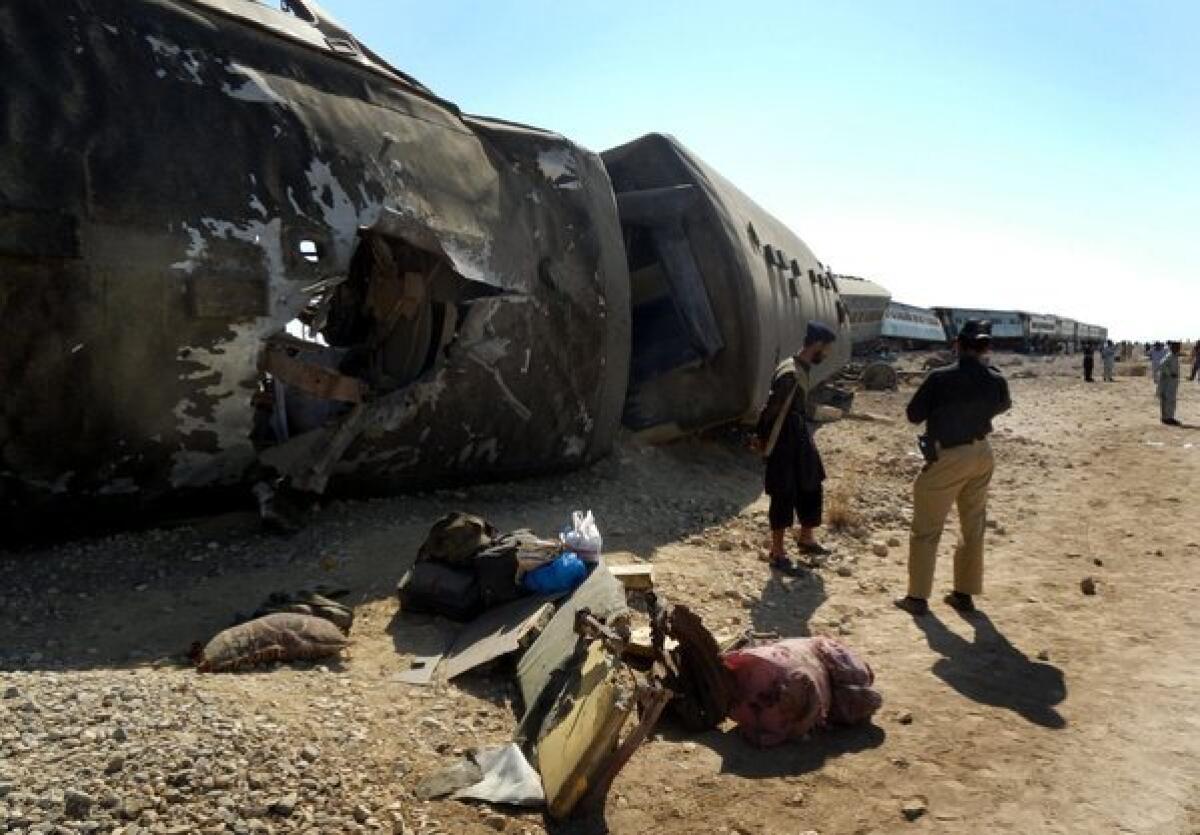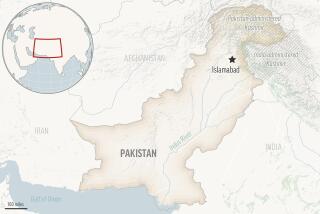Passenger train bombed in Pakistan, at least seven dead

ISLAMABAD, Pakistan -- A bomb struck a passenger train in southwestern Pakistan on Monday, killing at least seven people and wounding 10, according to police, in the latest attack to hit the violence-besieged nation.
The device reportedly detonated as carriages of the Jaffar Express passed through the Nasirabad district of insurgency-plagued Baluchistan province.
“The attackers planted [15 to 17 pounds] of explosive material on the railway tracks, which went off seconds before the train reached the Notal area,” said Noor Muhammad, the police chief of Dera Murad Jamali, the nearest town.
The blast derailed the train, Railways Minister Khawaja Saad Rafique told reporters, twisting rails and damaging several cars as it traveled from Rawalpindi to Quetta, the main town of Baluchistan province. The incident temporarily halted railway traffic between Baluchistan and other parts of Pakistan.
There was no immediate claim of responsibility, although police and analysts said they suspected Baluch rebels.
Six of the wounded reportedly were in critical condition. “The death toll may rise,” Rafique said.
State-run Radio Pakistan reported the bomb was detonated by remote control.
Malik Baloch, Baluchistan’s chief minister, condemned the attack, which he termed a terrorist act. Soon after the morning bombing, authorities cordoned off the area and started an investigation, reportedly calling on a bomb-disposal squad from Dera Murad Jamali to help determine the cause of the blast.
The train was carrying hundreds of passengers from eastern Punjab province back to Baluchistan after the Eid holiday. Victims were transported to the Civil Hospital Quetta, some 180 miles away.
Baluchistan has been the site of a separatist insurgency since 2004. Rebel groups, including the banned Baluch Republican Army, seek political autonomy and a larger share of profits from the region’s natural oil, gas and mineral resources. The area also has been hit by growing sectarian violence between the country’s majority Sunni Muslims and Shiite Muslims, who account for about 20% of Pakistan’s 180 million people.
“The Baloch Republican Army, a group fighting for the independence of Baluchistan, is very strong in the area and most probably they are behind the attack,” said Shahzada Zulfiqar, a Quetta-based journalist and security analyst. “This area is a hub of Baluch nationalist movements, while religious fundamentalist terrorist groups such as the Taliban have no presence here.”
In the past the Baloch Republican Army has launched attacks on national infrastructure targets including power lines, gas pipelines and government security forces. The Jaffar Express has been attacked at least twice this year.
On Aug. 16, suspected militants detonated a bomb on a Rawalpindi-bound passenger train in Bolan district before firing two rockets at the engine and opening fire, killing three people and wounding 30. This followed an attack on the same train in January in Mach, also in Bolan district, killing four people and injuring 13, Muhammad added.
And on Aug. 6, gunmen disguised as police killed 11 civilians and two security personnel after kidnapping them from a Punjab-bound passenger buses in Mach. The banned Baloch Liberation Army claimed responsibility in that attack.
ALSO:
Suicide bomber kills 5 on bus in southern Russia
Peru vows to investigate report of massive dolphin slaughter
Across spectrum, Egyptians denounce shooting at Coptic church
Mark.Magnier@latimes.com
Special correspondent Sahi reported from Islamabad and staff writer Magnier from New Delhi.
More to Read
Sign up for Essential California
The most important California stories and recommendations in your inbox every morning.
You may occasionally receive promotional content from the Los Angeles Times.










